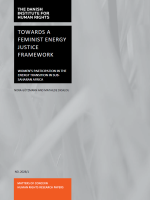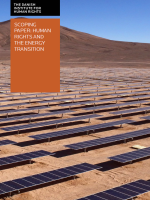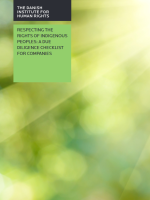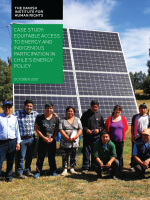Energy transition and human rights
With growing political support for clean energy and increasing volume of investment into renewable energy projects on a global scale, the intersection between human rights and the renewable sector is becoming increasingly critical. The development of renewable energy involves a multitude of risks towards human rights enjoyment.
Examples of publications on the topic:
By focusing on the implementation of the United Nations Guiding Principles on Business and Human Rights (UNGPs) in the context of the energy transition and access to energy in Sub-Saharan Africa, the Danish Institute for Human Rights (DIHR) supports local partners with the development of national actions plans on business and human rights, multi-stakeholder dialogue processes and policy recommendations.
Read more on the project:
In 2021, the DIHR joined the negotiations of an international Responsible Business Conduct Agreement for Renewable Energy developed under the auspices of the Dutch Social and Economic Council. This binding agreement between companies, trade unions, NGOs and state institutions aims at promoting collective action in the sector to improve respect for human rights throughout global value chains.
Responsible Business Conduct Agreement on Renewable Energy
The Danish Institute for Human rights is participating in the International Agreement on Responsible Business Conduct in the Renewable Energy Sector lead by Dutch Social and Economic Council. Through the agreement, organisations in the renewable energy sector are exploring the possibility to reach an international RBC agreement to collectively prevent and address issues in the value chain. The multi-stakeholder collaboration aims to offer shared solutions to address problems that companies cannot solve entirely by themselves. The process is currently in its dialogue and preparation phase.
You can read more about the agreement here (external site)
Join the webinar on September 7th 2020 co-organised by the DIHR and SER:
Indigenous people’s rights
While the development of renewable energy can contribute to positive impacts for local communities, including improving health, environment and energy access, renewable energy policy and projects can also have adverse impacts on indigenous peoples’ rights. In addition, in many instances, indigenous communities affected by renewable energy projects have not gained access to modern energy services.
Our activities aim to promote compliance of renewable energy projects with relevant international standards and instruments that protect indigenous peoples’ rights. This work is primarily contextualised within the framework of the 2030 Agenda for Sustainable Development, in particular SDG 7 (Affordable and Clean Energy), and relevant international human rights instruments, including the UN Declaration on the Rights of Indigenous Peoples, ILO Convention No. 169 and the UNGPs.
See our operational guidance for companies on due diligence for projects affecting indigenous peoples:
Read our case study on access to energy and indigenous participation in Chile's energy policy:







